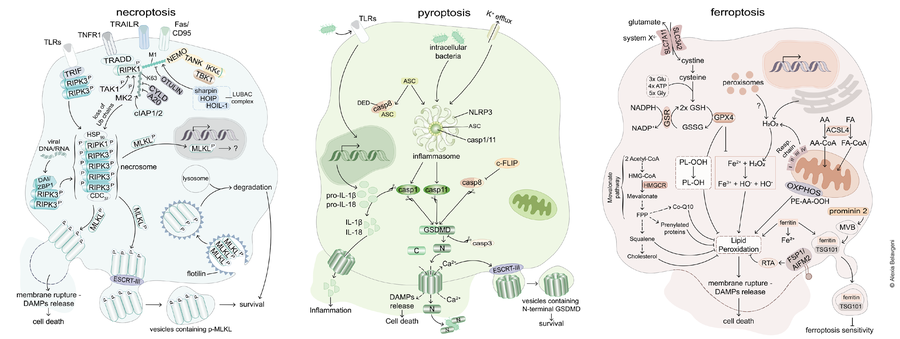Sie befinden sich hier
Inhalt
Preventing clinically relevant cell death
Understanding the molecular mechanisms of cell death has been at the center of medical research for decades. While in the past, apoptosis was at the center of this effort, emerging evidence has demonstrated that there are other forms of regulated cell death, which play crucial roles in several pathologies. Gaining a more detailed understanding of these pathways, such as necroptosis, ferroptosis and pyroptosis, is of great relevance in order to translate that knowledge into clinically relevant applications.
To achieve this, the Linkermann Lab is focusing on clinically relevant regulated cell death in the context of acute kidney injury (AKI), organ transplantation and diabetes among others. The lab is studying the respective cell death pathways underlying various pathophysiological conditions, which molecular switches might be involved and how to pharmacologically intervene. For this, cell death pathways are assessed using live-cell imaging, genetic modifications of key proteins, biomolecular and histological assessment of tissue damage and additional cell death assays. Further, we use in vivo models in order to understand the physiological relevance of different pathways, under which conditions these play a role and to establish small molecules as potential inhibitors.
Publications
- von Mässenhausen A, Schlecht MN, Beer K, Maremonti F, Tonnus W, Belavgeni A, Gavali S, Flade K, Riley JS, Zamora Gonzalez N, Brucker A, Becker JN, Tmava M, Meyer C, Peitzsch M, Hugo C, Gembardt F, Angeli JPF, Bornstein SR, Tait SWG, Linkermann A. Treatment with siRNAs is commonly associated with GPX4 up-regulation and target knockdown-independent sensitization to ferroptosis. Sci Adv. 2024. doi: 10.1126/sciadv.adk7329
- Belavgeni A, Maremonti F, Tonnus W, Stadtmüller M, Gavali S, Mallais M, Flade K, Brucker A, Becker JN, Beer K, Tmava M, Stumpf J, Gembardt F, Hugo C, Giacca M, Hale BG, Perakakis N, Sha W, Pratt DA, Schally AV, Bornstein SR, Linkermann A. vPIF-1 is an insulin-like antiferroptotic viral peptide. Proc Natl Acad Sci U S A. 2023. doi: 10.1073/pnas.2300320120
- von Mässenhausen A, Zamora Gonzalez N, Maremonti F, Belavgeni A, Tonnus W, Meyer C, Beer K, Hannani MT, Lau A, Peitzsch M, Hoppenz P, Locke S, Chavakis T, Kramann R, Muruve DA, Hugo C, Bornstein SR, Linkermann A. Dexamethasone sensitizes to ferroptosis by glucocorticoid receptor-induced dipeptidase-1 expression and glutathione depletion. Sci Adv. 2022. doi: 10.1126/sciadv.abl8920
- Tonnus W, Meyer C, Steinebach C, Belavgeni A, von Mässenhausen A, Gonzalez NZ, Maremonti F, Gembardt F, Himmerkus N, Latk M, Locke S, Marschner J, Li W, Short S, Doll S, Ingold I, Proneth B, Daniel C, Kabgani N, Kramann R, Motika S, Hergenrother PJ, Bornstein SR, Hugo C, Becker JU, Amann K, Anders HJ, Kreisel D, Pratt D, Gütschow M, Conrad M, Linkermann A. Dysfunction of the key ferroptosis-surveilling systems hypersensitizes mice to tubular necrosis during acute kidney injury. Nat Commun. 2021. doi: 10.1038/s41467-021-24712-6
- Belavgeni A, Bornstein SR, von Mässenhausen A, Tonnus W, Stumpf J, Meyer C, Othmar E, Latk M, Kanczkowski W, Kroiss M, Hantel C, Hugo C, Fassnacht M, Ziegler CG, Schally AV, Krone NP, Linkermann A. Exquisite sensitivity of adrenocortical carcinomas to induction of ferroptosis. Proc Natl Acad Sci U S A. 2019. doi: 10.1073/pnas.1912700116
- Sarhan M, Land WG, Tonnus W, Hugo CP, Linkermann A. Origin and Consequences of Necroinflammation. Physiol Rev. 2018. doi: 10.1152/physrev.00041.201
Kontextspalte
Contact

Prof. Dr. med. Andreas Linkermann
Klinikdirektor
V. Medizinische Klinik
Universitätsmedizin Mannheim
Theodor-Kutzer-Ufer 1-3
68167 Mannheim
Phone +49 621 383-3660
andreas.linkermann@medma.uni-heidelberg.de

